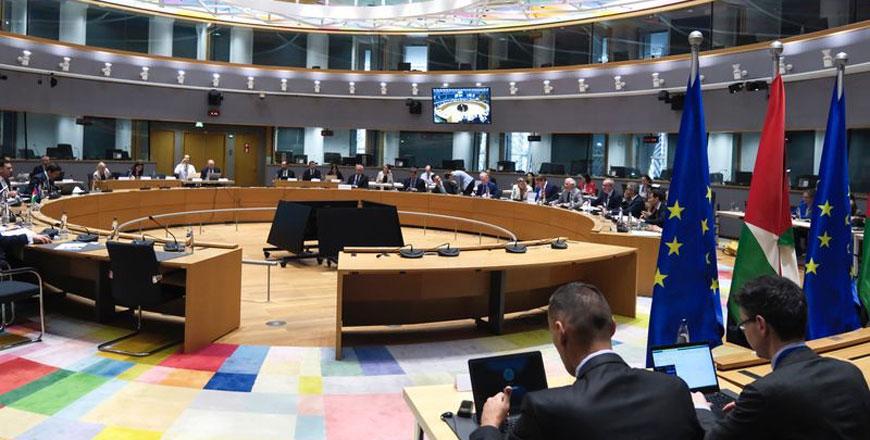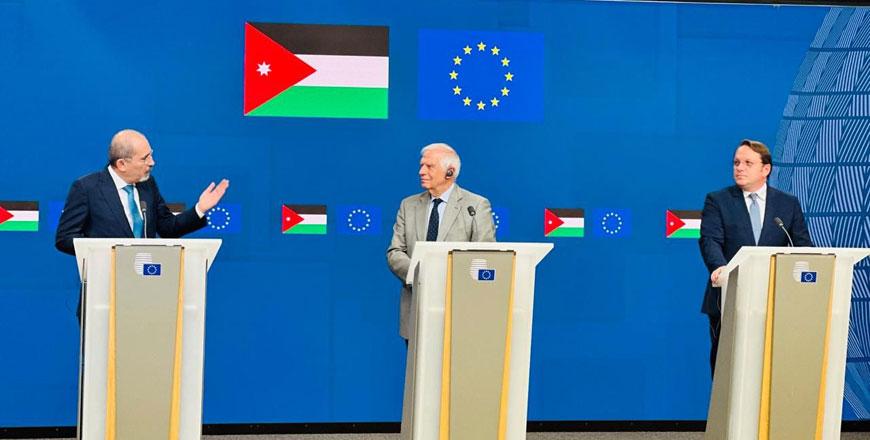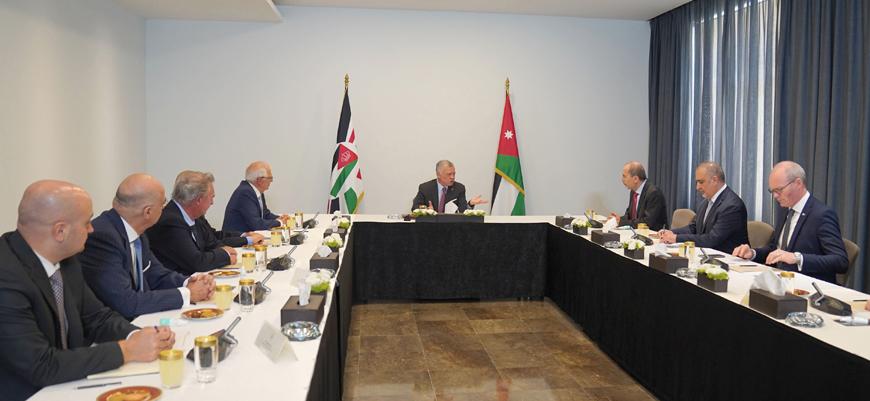You are here
15th EU-Jordan Association Council meeting confirms ‘strong, lasting partnership’
By JT - Jul 15,2024 - Last updated at Jul 15,2024

Deputy Prime Minister and Foreign Minister Ayman Safadi and High Representative of the European Union for Foreign Affairs and Security Policy, European Commission Vice-President Josep Borrell on Monday co-chair the 15th meeting of the EU-Jordan Association Council in Brussels (Photo courtesy of Foreign Ministry)
- Annual EU-Jordan Association Council meeting serves as crucial platform for bilateral dialogue, cooperation
- Meeting addresses wide range of political, economic, social issues of mutual interests
AMMAN — Deputy Prime Minister and Foreign Minister Ayman Safadi and High Representative of the European Union for Foreign Affairs and Security Policy, European Commission Vice-President Josep Borrell on Monday co-chaired the 15th meeting of the EU-Jordan Association Council in Brussels.
In a joint press conference after the meeting, Safadi, Borrell, and EU Commissioner for Neighbourhood Policy and Enlargement Oliver Varhelyi commended the "solid" relationship between Jordan and the EU and highlighted efforts to elevate their partnership to a strategic level, according to a Foreign Ministry statement.
Safadi noted that the discussions covered the European support to Jordan and the successful visit of His Majesty King Abdullah to Brussels last November, during which the EU unveiled a development assistance package to support Jordan's economic growth.
He thanked the EU for its comprehensive support for Jordan's political, economic, and administrative reforms.
"Jordan looks forward to closer cooperation with the EU to mitigate the impact of regional crises on the Kingdom and allow it to further advance its economic reforms," Safadi said.
On the Syrian crisis and refugee situation, Safadi stressed that the solution lies in the voluntary return of Syrian refugees. He reiterated Jordan's commitment to providing a dignified life for the refugees but stressed the need for continued international support.
On Gaza, Safadi said: "The aggression against Gaza must end and the violations of international law and war crimes must stop. The sole way to peace for Palestinians, Israelis, and the region is through the establishment of an independent, sovereign Palestinian state with Jerusalem as its capital, living in security and peace side by side with Israel".
"We should focus on ending this war, this humanitarian catastrophe, and ensuring that international law is upheld," he added.
Borrell reiterated that Jordan is a vital partner for the EU and a cornerstone of regional stability, underlining the need to raise the partnership to a strategic and comprehensive level, covering security, political, economic, and trade cooperation.
Borrell reiterated the EU's commitment to supporting Jordan's modernisation and reform efforts.
Varhelyi underlined the importance of the EU-Jordan relationship and pledged continued support for Jordan's modernisation and reform plans.
"We recognise the economic, political, and social challenges facing Jordan and have proposed additional support for Jordan to the EU Council and Parliament," he said.
Following the meeting, a joint communiqué was issued expressing both sides' mutual desire to upgrade their relationship to a strategic and comprehensive partnership.
The European Union and Jordan held the fifteenth meeting of their Association Council on 15 July 2024 in Brussels, in which they reviewed their increasingly dynamic and multifaceted partnership.
In the meeting, held in the framework of the EU-Jordan Association Agreement (in force since 2002) and the EU-Jordan Partnership Priorities for 2021-2027 adopted in June 2022, both parties recognized the importance they attach to their relationship. In this context, they noted that the geo-political landscape and protracted crises have changed drastically since the Agreement between Jordan and the EU on the Partnership Priorities. Both parties affirmed their willingness to work together towards elevating their relations to the level of a Strategic and Comprehensive Partnership.
The EU and Jordan reaffirmed their commitment to uphold their democratic principles and fundamental human rights as set out in the Universal Declaration on Human Rights and in the EU-Jordan Association Agreement.
They welcomed the progress achieved in the context of Jordan's political, economic, and administrative modernisation process, including recent economic and structural reforms and through the reform of Jordan’s public administration and efforts aiming at further empowering women and youth in decision-making and in public life. Both sides agreed to work together to further support capacity building in the education sector, including among other priorities, technical education and vocational training, scholarships, and addressing the educational gap caused by COVID-19. They underlined the important role that civil society organisations play in promoting human rights, socio-economic development, and prosperity. At the invitation of Jordanian authorities, the EU will deploy an Election Observation Mission (EOM) to accompany the 2024 parliamentary elections in Jordan.
The EU confirmed its continued commitment to assist Jordan in successfully tackling the multiple challenges in the context of increased uncertainty and geopolitical instability, as demonstrated by the new commitments made during HM King Abdullah II ibn Al Hussein’s visit to Brussels on 7 November 2023, amounting to more than €900 million in grants and loans, and by the European Commission’s recent proposal for a new Macro-Financial Assistance operation worth up to €500 million1.
The EU and Jordan also agreed to deepen cooperation in the field of economic and private-sector development. In this context, the second meeting of the “EU-Jordan Investment Platform” and the organization of the first-ever “EU-Jordan Business Forum” of 11 June 2024 in Amman allowed to further cement such partnership, representing another mark of EU’s efforts to support Jordan’s ambitious Economic Modernisation, fostering a green energy and digital transition, enhancing EU investments – notably through the Economic and Investment Plan –, and increasing Jordanian exports into the EU.
Both sides also confirmed their commitment to continue their mutual engagement in the justice sector, on security and counterterrorism, as well as to increase efforts to combat the smuggling of drugs and weapons targeting Jordan and neighbouring countries, with also consequences for the EU. The EU underlined its readiness to continue assisting Jordan in tackling these challenges, including through the European Peace Facility.
The meeting also allowed for an exchange of views on several regional crises and global challenges. Recalling the different United Nations General Assembly resolutions on Ukraine, the EU and Jordan reiterated their shared principles in line with the UN Charter of respect for international law, territorial integrity, national sovereignty, and the need to solve conflicts by peaceful means. They condemned all violations of international humanitarian law and violations and abuses of human rights across all conflict areas.
The EU and Jordan will redouble efforts to reach an immediate and lasting ceasefire in Gaza that ends the war and the humanitarian catastrophe it causes without delay and reiterate their call for the immediate and full implementation of the relevant United Nations Security Council Resolutions, and support for the US ceasefire proposal announced on 31 May 2024, as per UNSC Resolution 2735.
They welcomed the Summit held in Jordan on 11 June at the joint initiative of His Majesty King Abdullah II, His Excellency Abdel Fattah El-Sisi, President of Egypt, and His Excellency António Guterres, Secretary-General of the United Nations for a “Call for Action: Urgent Humanitarian Response for Gaza”, and the EU confirmed its readiness to leverage its instruments to support the delivery of humanitarian aid into Gaza via the Jordanian corridor. Both sides stressed the necessity to uphold International Law and to protect civilians by the universal principles of International Humanitarian Law, and rejection of any violence against civilians, and any form of individual or collective displacement, forced or otherwise, of Palestinians from the Gaza Strip and the West Bank, including East Jerusalem. The EU and Jordan also underlined the essential role of the United Nations Relief and Works Agency for Palestine Refugees (UNRWA) in providing vital services to millions of people in the region and expressed their commitment to continue supporting the Agency to fulfill its UN mandate.
The EU and Jordan reiterated that the only path to a just, lasting, and comprehensive resolution of the conflict in the Middle East is the two-state solution that ends occupation and leads to the establishment of an independent, contiguous, sovereign, and viable Palestinian State, based on the lines of 4 June 1967, living side by side with the State of Israel in peace, security and mutual recognition, with East Jerusalem as its capital, by international law and UN Security Council resolutions, and agreed parameters. The EU and Jordan also reiterated the importance of upholding the historic status quo for the holy sites in Jerusalem, including the historic Hashemite Custodianship.
The EU and Jordan stressed the necessity of ending the Syrian crisis through a political solution by UN Security Council Resolution 2254, preserving the unity and territorial integrity of Syria, ensuring the enduring defeat of terrorism, alleviating the humanitarian suffering of the Syrian people, and leading to conditions conducive to the voluntary, dignified, and safe return of refugees. They agreed that achieving this solution is key to regional stability. The parties discussed the implementation of the outcomes of the Amman Declaration of 1st May 2023 and Cairo Statement of 15th August 2023 encompassing the ‘Step for Step’ approach and the role of the Arab Liaison Contact Group on Syria.
Recognizing Jordan’s extraordinary generosity in hosting Syrian refugees for over a decade and the adverse impact of the Syria crisis on the country, the EU, which remains the first donor to the Syria response in the context of dwindling international support, reaffirmed its unabated commitment to continue supporting both refugee and host communities in the Hashemite Kingdom of Jordan and the region, as manifested by the significant pledges mobilised by the recent Brussels VIII Conference on “Supporting the future of Syria and the region” (27 May 2024). The meeting featured the presence of Zeina Toukan, Minister of Planning and International Cooperation, and representatives of EU member states.
Related Articles
AMMAN — Deputy Prime Minister and Foreign Minister Ayman Safadi reiterated on Monday the urgency to end the aggression on Gaza, the war crim
AMMAN — His Majesty King Abdullah on Thursday reaffirmed the strong relations between Jordan and the European Union, at a meeting with EU Hi
AMMAN — The European Council has adopted an assistance measure under the European Peace Facility (EPF) worth €13.25 million in support of th
















